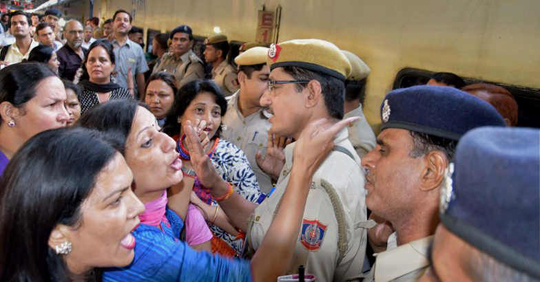New Delhi, Sept 8: Delhi Chief Minister Arvind Kejriwal was today heckled by activists from BJP, its ally Akali Dal and Congress, who staged protests at railway stations over allegations of misconduct against AAP leaders, as he started his four-day visit to Punjab to give a push to the party's poll campaign in the state.

Activists led by Delhi BJP women's wing president Kamaljeet Sehrawat and party spokesman Praveen Kapoor raised slogans and waved bangles towards Kejriwal, who arrived at platform number 1 at New Delhi railway station to board a train for Punjab at around 7 AM.
Some protesters jostled with the policemen and Kejriwal was caught in the melee. They demanded that Kejriwal speak on the alleged "misconduct" of his MLAs and expel Ashutosh for his controversial blog defending Sandeep Kumar, who was sacked as minister over an alleged sex scandal.
Blaming Prime Minister Narendra Modi and the Delhi Police for the alleged manhandling of the Chief Minister at the hands of women protesters of the BJP, the Aam Aadmi Party said the law enforcement agency was a "mute spectator" during the "pre-planned" episode.
BJP, however, denied any manhandling and said party activists resorted to political protest.
"It is sad and shameful that the those who once talked of daily dialogue with people today term political protest as an attack," Kapoor said. As Kejriwal got down from the Delhi-Ludhiana-Amritsar Shatabdi express at Ludhiana railway station, he was again greeted by protesters from the ruling SAD's youth wing and opposition Congress' women's wing
Youth Akali Dal leader Gurpreet Singh Gosha led by other party activists tried to give bangles to Kejriwal, claiming his government had failed on all fronts.
Congress women wing's Ludhiana district president Leena Tapria, who also led a group of party activists, raised slogans like "Kejriwal Go Back".
As Kejriwal stepped out of the railway station, he faced another group of protesters, who claimed to be from a Hindu outfit. However, the Punjab police did not allow any protester to come near the Delhi Chief Minister.
Police here said that they had deputed two Additional Deputy Commissioners of Police rank officers at the railway station besides deputing police personnel in strength to ensure there was no untoward incident.
Kejriwal's visit today also coincides with the launch of a fourth front in the state by cricketer-turned-politician Navjot Singh Sidhu ahead of 2017 assembly polls.
Sidhu is set to launch 'Awaaz-e-Punjab' front along with MLA Pargat Singh and two Ludhiana MLA brothers Simarjit Singh Bains and Balwinder Bains. The AAP has been taken aback by the development as there was speculation that Sidhu could join the party after he parted ways with BJP and resigned from his Rajya Sabha membership.
The AAP, which has been projecting itself as a viable alternative to Congress and SAD-BJP in the state, has faced setbacks in the state including sacking of Sucha Singh Chhotepur as Punjab Convenor and Kejriwal's visit is aimed at hearing the grievances of partymen and bringing the campaign back on track.





Comments
Chor party kejriwal se darte hai
Add new comment